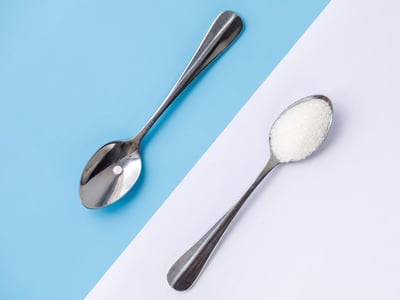Breast Cancer



Relevance: Medium
Most relevant for: People who consume artificial sweeteners
Study: Do artificial sweeteners increase the risk of cancer?
A large study of adults in France suggests that artificial sweeteners may increase the risk of certain cancers. (posted 6/21/2022). Este artículo está disponible en español.
READ MORE ›


Relevance: Medium-High
Most relevant for: Transgender men with an inherited mutation
Article: Breast cancer risk for transgender men with inherited mutations
There is little information related to the risks and treatment options for transgender men and nonbinary people who are at high-risk for breast cancer due to an inherited BRCA1 or BRCA2 mutation. We review an expert viewpoint on the implications of a BRCA mutation for transgender men undergoing breast removal as part of their gender-affirming care plan. (posted 5/19/22)
Este artículo está disponible en español.
READ MORE ›


Relevance: Medium
Most relevant for: people who take or consider taking melatonin to help with sleep.
Study: Increasing melatonin use raises concerns
Adult use of melatonin as a sleep aid has increased even though its benefits and risks are not well understood. This study looked at trends in melatonin use over the last 19 years. (Posted 4/14/2022)
Este artículo está disponible en español.
READ MORE ›


Relevance: Medium-High
Most relevant for: Black women in the U.S.
Study: New tool to predict breast cancer risk for Black women
An important part of making decisions about breast cancer screening and prevention is knowing your breast cancer risk. Specific tools are used to identify people who would benefit from early and/or additional screening and chemoprevention or those who would most benefit from genetic counseling and testing. Because these tools were developed using data mostly from white women, they are unable to predict cancer risk as well for Black women. To begin to address these gaps, researchers developed a new tool specifically designed to predict breast cancer risk for Black women. This tool has been shown to work well, especially for younger Black women. (posted 3/22/2022) Este artículo está disponible en español.
READ MORE ›


Relevance: High
Most relevant for: women of Hawai’ian, Filipino or Asian American ancestry.
Study: The chance of a second breast cancer is higher among some Hawai'ian women
Women diagnosed with ductal carcinoma in situ (DCIS), an early form of breast cancer, are more likely to have a second breast cancer diagnosis if they are of Native Hawai'ian, Filipino or Japanese ancestry than women of other racial or ethnic groups. (posted 3/15/22)
Este artículo está disponible en español.
READ MORE ›


Relevance: Medium-High
Most relevant for: People with inherited mutations in BRCA1 or BRCA2 who have been diagnosed with early-stage, HER2-negative breast cancer.
Study: Quality of life for people with early-stage breast cancer who participated in the OlympiA clinical trial
The OlympiA study showed that the PARP inhibitor olaparib (Lynparza) is effective when used as maintenance therapy for people with an inherited BRCA1 or BRCA2 mutation who have early-stage breast cancer. Patient-reported outcomes from OlympiA suggest that olaparib was well tolerated and did not reduce quality of life or delay recovery from chemotherapy. (posted 2/22/22) Update: Based on OlympiA results, the FDA approved olaparib as adjuvant treatment for people with an inherited BRCA mutation who were diagnosed with early-stage HER2-negative breast cancer at high risk for recurrence. (03/11/2022).
Este artículo está disponible en español.
READ MORE ›


Relevance: High
Most relevant for: People with genetic test result called a VUS
Article: Chris Evert's ovarian cancer diagnosis highlights the importance of genetic counseling and testing
Tennis star Chris Evert shared her story about a change in her sister's genetic test results that led Ms. Evert to have genetic testing and her decision to have her ovaries removed to lower her cancer risk. Ovarian cancer was found at the time of Ms. Evert’s surgery, but fortunately, it was caught early. Her story highlights the importance of genetic counseling, testing and post-testing follow-up with experts. (Posted 2/8/22). Este artículo está disponible en español.
READ MORE ›


Relevance: Medium-High
Most relevant for: People interested in using cannabis to relieve treatment side effects.
Study: Cannabis use among breast cancer patients
This study looked at patterns of cannabis use among breast cancer patients who are members of online health communities. Almost half of the study participants reported using cannabis to help manage treatment symptoms and side effects. The study also looked at reasons why patients used cannabis, where they obtained it and whether they perceived cannabis to be safe. While this study only looked at cannabis use among breast cancer patients it is likely results would be similar among patients diagnosed with other types of cancers. (posted 1/25/22)
Este artículo está disponible en español.
READ MORE ›


Relevance: High
Most relevant for: People concerned about the impact of chemotherapy
Study: Physical activity may prevent chemotherapy-related cognitive decline in women with breast cancer
Many people experience chemo brain or chemo fog (cognitive effects) during and after chemotherapy. Researchers looked at the impact of physical activity on chemotherapy-related decline in memory, attention and information processing in women with breast cancer. This study shows that more physical activity before and during chemotherapy is linked to better information processing after chemotherapy. (Posted 1/6/22)
Este artículo está disponible en español.
READ MORE ›


Relevance: Medium-High
Most relevant for: People with or considering breast implants
Update: Stronger guidance about breast implant safety
The FDA issued new guidance for breast implants so that all people with breast implants have the appropriate information to understand and make decisions about their healthcare. Required features include box warning, patient decision checklist, guidelines for screening for implant ruptures and patient device cards. (posted 12/14/21)
Este artículo está disponible en español.
READ MORE ›